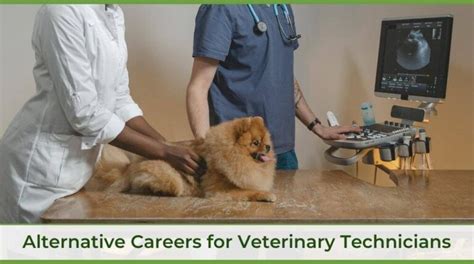As a veterinary technician, you've dedicated your career to caring for animals and supporting the vital work of veterinarians. However, you may be wondering if there are other career paths that utilize your skills and experience beyond the traditional animal hospital setting. The good news is that vet techs have a versatile set of skills that can be applied to a wide range of industries and roles.
In this article, we'll explore 10 alternative careers that vet techs can consider, highlighting the benefits, required skills, and potential salary ranges for each. Whether you're looking for a change of pace, more work-life balance, or new challenges, we've got you covered.
Understanding the Skills and Qualities of Vet Techs
Before diving into the alternative careers, it's essential to understand the skills and qualities that make vet techs valuable professionals. Some of the key skills and qualities include:
- Strong communication and interpersonal skills
- Ability to work well under pressure and in fast-paced environments
- Compassion and empathy for animals and their owners
- Attention to detail and ability to follow instructions
- Physical stamina and ability to lift and move animals
- Knowledge of animal behavior, anatomy, and physiology
These skills are highly transferable and can be applied to various industries and roles.
Alternative Career Options for Vet Techs
Here are 10 alternative careers that vet techs can consider:
1. Pharmaceutical Sales Representative
As a pharmaceutical sales representative, you'll work with veterinarians, veterinary clinics, and animal hospitals to promote and sell pharmaceutical products. Your knowledge of animal health and behavior will be valuable in this role.
- Required skills: Communication, marketing, and sales skills
- Potential salary range: $60,000 - $100,000 per year

2. Animal Welfare Organization Professional
If you're passionate about animal welfare, you may consider working for an organization that focuses on animal advocacy and welfare. Your experience as a vet tech can be valuable in this role.
- Required skills: Communication, marketing, and advocacy skills
- Potential salary range: $40,000 - $70,000 per year

3. Veterinary Education and Training
If you enjoy teaching and mentoring, you may consider a career in veterinary education and training. You can work as an instructor, professor, or trainer, teaching students and professionals about animal health and behavior.
- Required skills: Teaching, communication, and presentation skills
- Potential salary range: $50,000 - $90,000 per year

4. Veterinary Research Assistant
As a veterinary research assistant, you'll work with researchers to conduct studies and experiments on animal health and behavior. Your knowledge of animal physiology and behavior will be valuable in this role.
- Required skills: Research, analytical, and problem-solving skills
- Potential salary range: $45,000 - $75,000 per year

5. Animal Behaviorist
As an animal behaviorist, you'll work with animals and their owners to address behavioral issues and develop training programs. Your knowledge of animal behavior and psychology will be valuable in this role.
- Required skills: Communication, observation, and analytical skills
- Potential salary range: $50,000 - $80,000 per year

6. Veterinary Consultant
As a veterinary consultant, you'll work with veterinarians, veterinary clinics, and animal hospitals to provide advice and guidance on animal health and behavior. Your knowledge of animal health and behavior will be valuable in this role.
- Required skills: Communication, problem-solving, and analytical skills
- Potential salary range: $60,000 - $100,000 per year

7. Animal Nutritionist
As an animal nutritionist, you'll work with veterinarians, pet owners, and animal feed manufacturers to develop and recommend animal diets. Your knowledge of animal nutrition and physiology will be valuable in this role.
- Required skills: Communication, analytical, and problem-solving skills
- Potential salary range: $50,000 - $80,000 per year

8. Veterinary Writer or Editor
If you enjoy writing and communicating complex information, you may consider a career as a veterinary writer or editor. You'll work with veterinarians, researchers, and publishers to create and edit content on animal health and behavior.
- Required skills: Writing, communication, and editing skills
- Potential salary range: $40,000 - $70,000 per year

9. Veterinary Marketing Specialist
As a veterinary marketing specialist, you'll work with veterinarians, veterinary clinics, and animal hospitals to develop and implement marketing strategies. Your knowledge of animal health and behavior will be valuable in this role.
- Required skills: Marketing, communication, and analytical skills
- Potential salary range: $50,000 - $80,000 per year

10. Animal Conservation Professional
If you're passionate about animal conservation, you may consider working for an organization that focuses on protecting and preserving animal species and habitats. Your experience as a vet tech can be valuable in this role.
- Required skills: Communication, advocacy, and project management skills
- Potential salary range: $40,000 - $70,000 per year

Conclusion
As a vet tech, you have a versatile set of skills that can be applied to a wide range of industries and roles. Whether you're looking for a change of pace, more work-life balance, or new challenges, there are many alternative careers that you can consider. Remember to highlight your transferable skills, such as communication, problem-solving, and analytical skills, and don't be afraid to explore new opportunities.






What are some alternative careers for veterinary technicians?
+Some alternative careers for veterinary technicians include pharmaceutical sales representative, animal welfare organization professional, veterinary education and training, veterinary research assistant, animal behaviorist, veterinary consultant, animal nutritionist, veterinary writer or editor, veterinary marketing specialist, and animal conservation professional.
What skills are transferable from a veterinary technician role?
+Some transferable skills from a veterinary technician role include communication, problem-solving, analytical, and marketing skills.
How can I transition into a new career?
+To transition into a new career, consider highlighting your transferable skills, networking with professionals in your desired field, and seeking out training or education to gain new skills.
